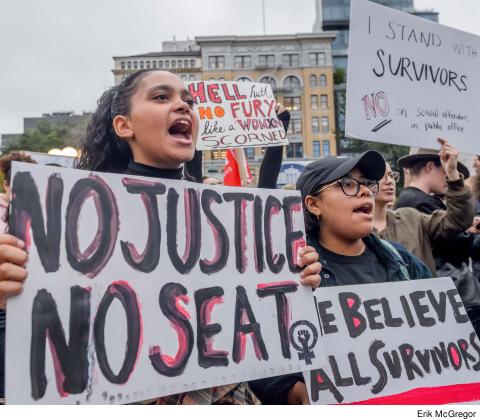 |
The Lexington Avenue subway line that regularly delivers me from Brooklyn to Hunter College, where I have taught as an adjunct for more than several years, was mercifully swift – I arrived in the “normal” 45 minutes, even under the crippling austerity of the Metropolitan Transportation Authority.
With the extra half hour I had allotted myself to make up for the new reality of perpetual subway delays and a vertical commute doubled by single-elevator access in Hunter North, I almost had time to buy coffee from one of the surrounding Upper East Side caffeine purveyors, these being the only options now that the cafeteria and Starbucks are closed for business. (Without cash, as I was still awaiting my paycheck, the many street cart options were temporarily out of the question.)
MAKING CONNECTIONS
In my class, I was excited, despite being without coffee, because the discussion turned to the topic of settler colonialism, the subject of a recent lecture, and the logic of “empty space” ready and waiting to be colonized. One student likened the simultaneity of war for land, and this logic of empty land, with the “open secret” of sexual assault on display at the confirmation hearings for Brett Kavanaugh, now a Supreme Court Justice, indicating that she believed Republican supporters of Kavanaugh are similar to settler ideologues of that period, in that they are aware of Kavanaugh’s guilt and the ubiquity of sexual assault as a mechanism of control, but wedded to an overt denial (or repression) of the truth.
Any educator loves seeing students draw compelling connections, even seemingly tenuous ones; for me this was a welcome note that made me pause and reflect on the events of the last two weeks. I have spent it organizing with the International Women’s Strike (IWS), a coalition of women and queer activists from political and labor organizations, locally and nationally, to call for a series of demonstrations and walkouts leading up to and following Kavanaugh’s confirmation. And, like so many people, I have been inundated on social media with a new wave of stories and #MeToo posts about the experiences my friends and family have had with sexual assault at school, at work and in personal relationships. I even shared my own stories, including one about a rich angry man who reminded me very much of the controversial judge.
POOR CONDITIONS
Those stories, many about out-of-control frat boys like Kavanaugh once was, along with the sorry physical state of Hunter College have weighed on me. Reading news articles about politicians mocking sexual assault survivors including Christine Blasey Ford and Anita Hill, but also survivors represented in a teacher-led sit in in West Virginia Senator Joe Manchin’s office, filled me with despair and rage at the disrespect for the basic humanity of women and for regular working-class people that elite politicians so easily demonstrated. (Manchin was the one Democrat who voted to confirm Kavanaugh.)
This feeling of disrespect was just compounded when looking around at the condition of my beloved Hunter College. No cafeteria, no bookstore, reports of bedbugs in the library, disabled access doors often themselves disabled. Even our ugly statue is gone or out of commission, at least for now. Students and faculty packed like sardines in the single elevator that goes to any given floor in the building where I work. It really felt, to me, this week, like a message about how little respect politicians and the wealthy have for us, for our students and for the project of educating the working class of New York City, to which so many of us devote so much of our time and ourselves.
But I also found hope, in the example of West Virginia teachers, moving from strikes to sit-ins and arrests, and in that of the thousands of women and feminists who demonstrated three times this week in New York, as well as in Washington DC and cities and towns across the country, sometimes engaging in civil disobedience. Kavanaugh was confirmed, yes, but this week, I also didn’t feel alone in my anger and sense of disrespect. I felt my experiences as a union member, as a labor activist and as a feminist organizer beginning to come together.
BROAD SOLIDARITY
Reading about Kavanaugh’s growing list of accusers, I remembered that hotel workers across the country are on strike and thought of the brave example of Nafissatou Diallo who, with the support of her hotel workers’ union local, confronted Dominique Strauss-Kahn for a rape that took place yards from the location of Monday’s demonstration at the Yale club. I thought of the strike that took place in Chicago last year for greater worker protections against sexual assault and harassment by guests and management, and which paved the way for a major contract victory for hotel workers announced recently. I thought of Fight for $15 workers at McDonalds striking over sexual harassment.
For me the lesson is that, in my own fight for better pay and working conditions as a CUNY adjunct (and as an SEIU member at Fordham University where we recently won $7K for adjuncts), the broader the solidarity we can mobilize, the more our fight takes on the overall atmosphere of disrespect which we all must navigate daily, the more powerful it will be. We are not alone. The more connections we can build among the disrespected, even those that might at first seem tenuous, the more powerful we will be. As my friend and leader of West Virginia teacher strikes Emily Comer put it, in reference to teachers and sexual assault survivors who were ultimately arrested for sitting in, “y’all are my heroes.”
My heroes in this political moment are the women, feminists and union members who are standing up and fighting back, who have made it clear that this defeat, however painful, is a beginning, not an end.
Kate Doyle Griffiths is an adjunct instructor of anthropology at Hunter College.

